In recent years, Japanese football players have been joining European clubs, indicating Japan’s strong emphasis on nurturing athletes, especially in football. The influx of Japanese players into European clubs has made the sport increasingly popular nationwide. Additionally, they will be seen competing in the FIFA World Cup 2022. Let’s join bestsoccertips.com to see the top 10 best Japan football player of all time.
Who is Japan’s best football player?
1. Takumi Minamino
Takumi Minamino, born on January 16, 1995, is a professional Japanese footballer who plays as an attacking midfielder or winger for Monaco in Ligue 1 and the Japan national team. Minamino began his club career at Cerezo Osaka in the J1 League in 2012.
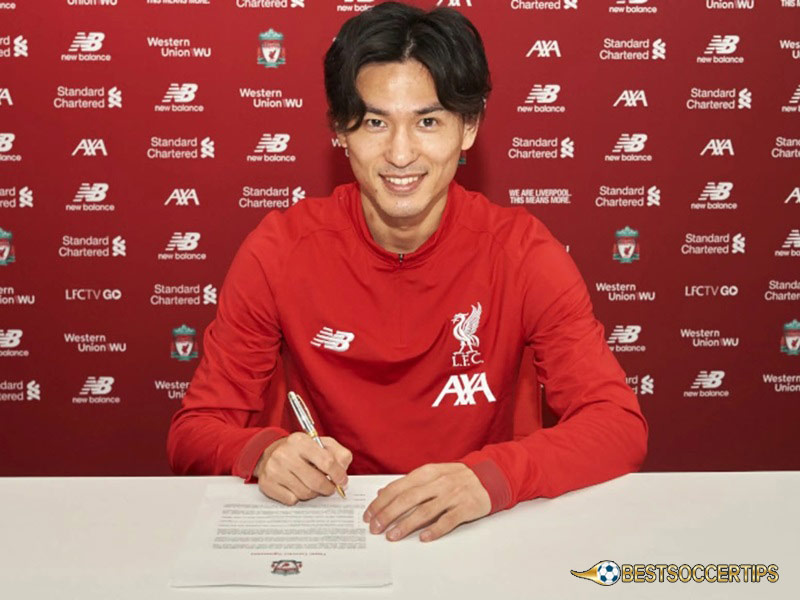
In his debut season, Minamino was honored as the Rookie of the Year by the league. In 2014, he moved to Austrian club Red Bull Salzburg, where he enjoyed four successful seasons. After an impressive performance for the club, he joined Liverpool on January 1, 2020. Minamino made his senior international debut for Japan in 2015. He played a key role in the team reaching the final of the 2019 AFC Asian Cup.
2. Yuki Soma
Yuki Soma, born on February 25, 1997, is a renowned Japanese footballer, known for his prowess as a forward for Nagoya Grampus and the Japan national team. His career is not only a journey through various clubs but also a path filled with promise and notable achievements.
Yuki’s first step in his career was joining Fuda SC, where he began to showcase his passion and talent. He then moved to Mitsubishi Yowa Chofu, where he continued to develop and make a mark in Japanese football.
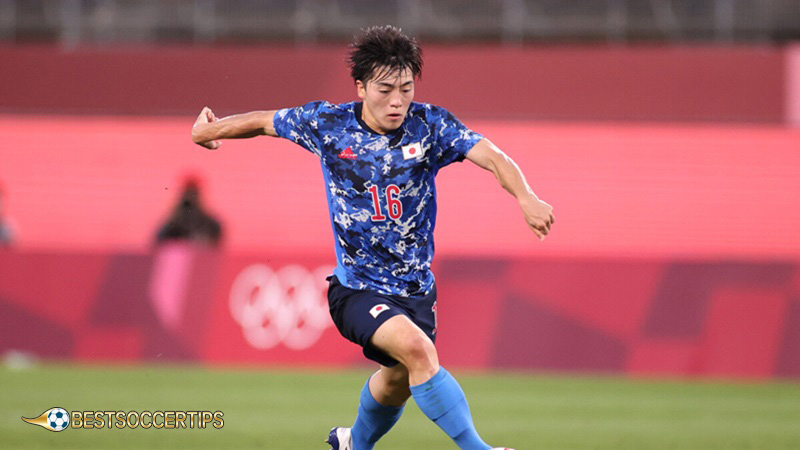
However, Yuki’s career didn’t stop there. He ventured into the elite world of football, representing two top clubs in Japan: Nagoya Grampus and Kashima Antlers. Currently, he is playing for Kashima Antlers on loan, where he continues to impress with his skills and dedication.
3. Maya Yoshida
Maya Yoshida, born on August 24, 1988, is a renowned Japanese footballer who plays a crucial role as a central defender for Bundesliga club Schalke 04 and also serves as the captain of the Japan national team. His career is not only a journey through various football clubs but also a notable path filled with successes and profound contributions.

Maya’s initial steps in his football career were at Nagoya Grampus from 2001 to 2006, where he began to assert his talent and demonstrate potential. He then opened the doors to his elite career by moving to Europe, playing for several prestigious clubs.
4. Junichi Inamoto
With his bleached blonde hair, Inamoto was one of the first Japanese players to venture into European football. In his case, the team was Arsenal, but he struggled to meet the intensity when he arrived. Arsene Wenger recently stated, “At the time, Inamoto lacked a bit of belief in his quality because he was a very good football player. He was still in the period when Japanese players didn’t feel they were at the top level. The rest of the world’s standard”.
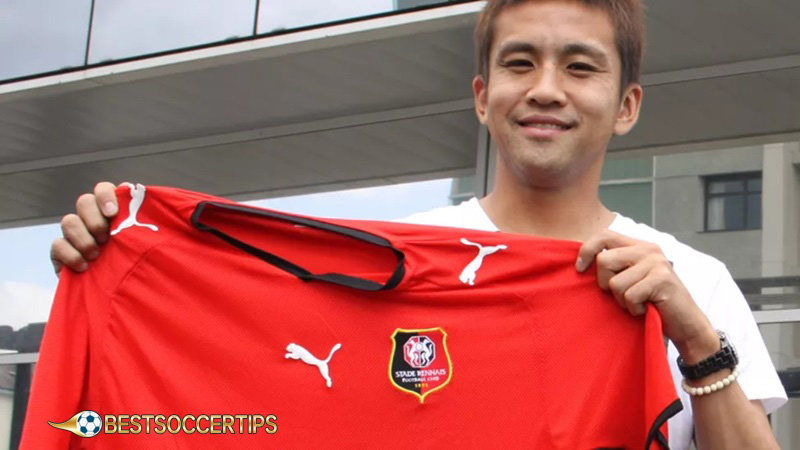
Moving to Fulham in 2002 seemed to rejuvenate this midfielder, with goals scored against teams like Manchester United, but a leg injury halted his time in West London. Subsequent stints with West Bromwich Albion and Cardiff City couldn’t reignite the spark, and after a brief stint in Europe, Inamoto returned home in 2010. He often produced goods for Japan, with his best period being at the 2002 World Cup. He finished the tournament as his country’s leading goal scorer thanks to goals against Belgium and Russia. Such form earned him a Ballon d’Or nomination that year, although he didn’t make the top 20.
5. Honda Keisuke
Japan had never won a World Cup match on home soil until 2010 when Honda secured a 1-0 victory over Cameroon in Bloemfontein. The attacking midfielder then solidified that with a goal in the final group stage match against Denmark, before setting up Okazaki with a deft touch. At that tournament, he was voted FIFA’s Man of the Match in 3 out of Japan’s 4 games, and he was also honored as Japan’s Player of the Year.
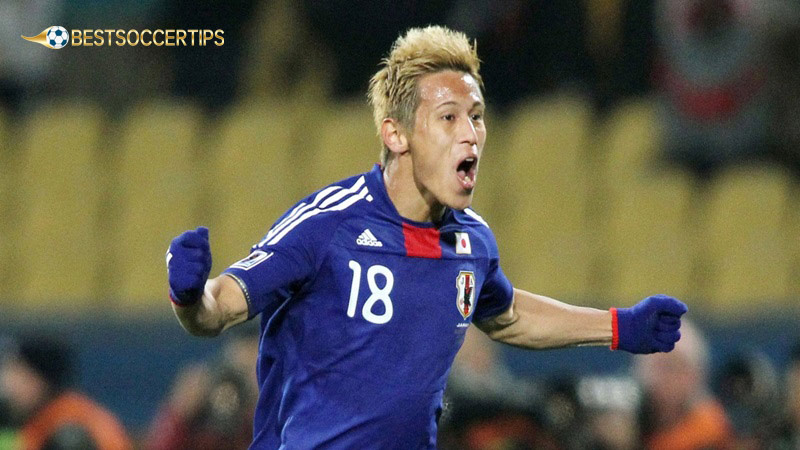
His club career has taken him to the Netherlands, Russia, and now Italy, after joining Serie A giants AC Milan in January. While he awaits silverware with the Rossoneri, he has won the Russian Premier League once and the Russian Cup twice with CSKA Moscow.
6. Yurahito Endo
Unlike his international counterparts, Endo has never had intentions of testing himself abroad. After early stints with Yokohama Flugels and Kyoto Purple Sanga, this 34-year-old player has been closely associated with Gamba Osaka since 2001. Since joining Gamba, Endo has been named in the J-League Best XI a remarkable 10 times, showcasing his stability and undeniable contributions to the team.
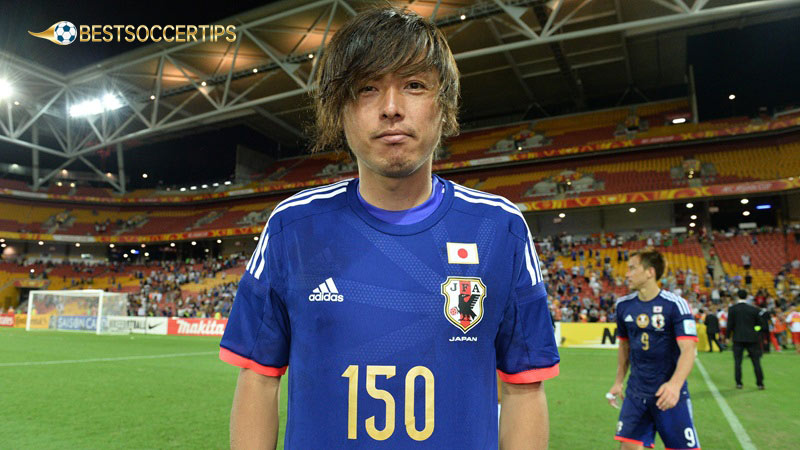
Declining opportunities to play in Europe hasn’t diminished Endo’s prominence on the international stage. He has earned more caps for the Samurai Blue than any other player, providing stability and quality to Japan’s national team. A two-time winner of the Asian Cup in 2004 and 2007, Endo also scored one of the crucial goals in the 3-1 victory over Denmark in the 2010 World Cup, contributing to remarkable records and memories in his career.
7. Shinji Kagawa
At just 25 years old, it’s entirely plausible that when Kagawa concludes his career, he will be regarded as Japan’s finest footballer to date. Making a name for himself at Cerezo Osaka, Borussia Dortmund brought the player to the Bundesliga in 2010 for a mere £300,000. Eventually, he’d make that fee look like a daylight robbery, helping Dortmund to two Bundesliga titles in his two seasons with the club.
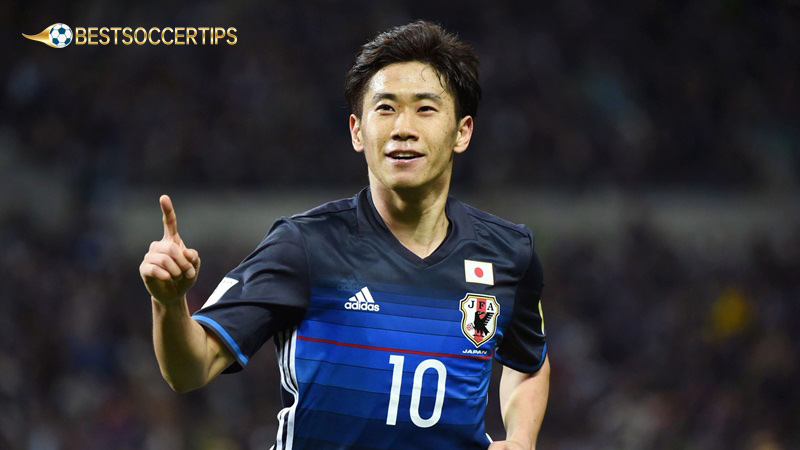
Coincidentally, in his final appearance before signing with Manchester United in 2012, he scored one goal and assisted another as Dortmund defeated Bayern Munich in the DFB-Pokal final. Success continued in the season prior with United as he got his hands on the Premier League trophy, notably with a hat-trick against Norwich City. His omission from the squad for the 2010 World Cup surprised many, but he returned the following year to help Japan win the Asian Cup. Twelve months later, Kagawa was voted Asia’s International Player of the Year.
8. Hidetoshi Nakata
Hidetoshi Nakata played a significant role in Japan’s football history, particularly at the 1998 World Cup, where he scored nearly half of the national team’s goals with 5, helping Japan reach the finals of this major tournament for the first time. This made him an icon among Japanese football fans.

Nakata’s success wasn’t just demonstrated on the field but was also acknowledged through nominations for prestigious individual awards like the Ballon d’Or and FIFA World Player of the Year. He was nominated three times for the Ballon d’Or and four times for the FIFA World Player of the Year award in his career.
9. Kazuyoshi Miura
Kazuyoshi Miura, a professional Japanese footballer, is truly a phenomenon with age not hindering his dynamism on the football field. Surpassing the age of 50, he continues to be a player with strength and fierce spirit. Miura’s patience, commitment, and passion have been a source of inspiration not only for Japanese football fans but also for young players aspiring to pursue their careers.
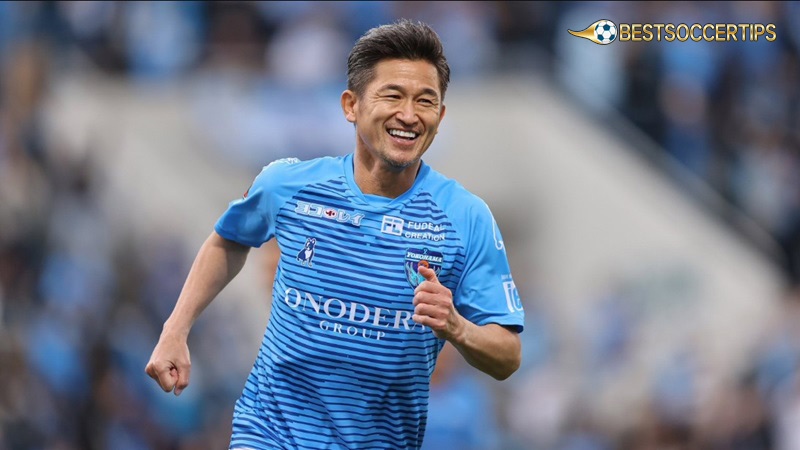
With his association with Yokohama FC, Miura holds the global record as the oldest goal scorer in a professional football league, an impressive achievement showcasing his perseverance and talent. Additionally, he has contributed significantly to the Japan national team over a decade, scoring 55 goals in 89 appearances, bringing joy and hope to Japanese football fans.
10. Kunishige Kamamoto
Kunishige Kamamoto is indeed an indispensable figure in the list of outstanding Japanese footballers, with one of the greatest international goal-scoring records in the world. Not only a pride of Japan, Kamamoto is also an icon of class and power on the football field.
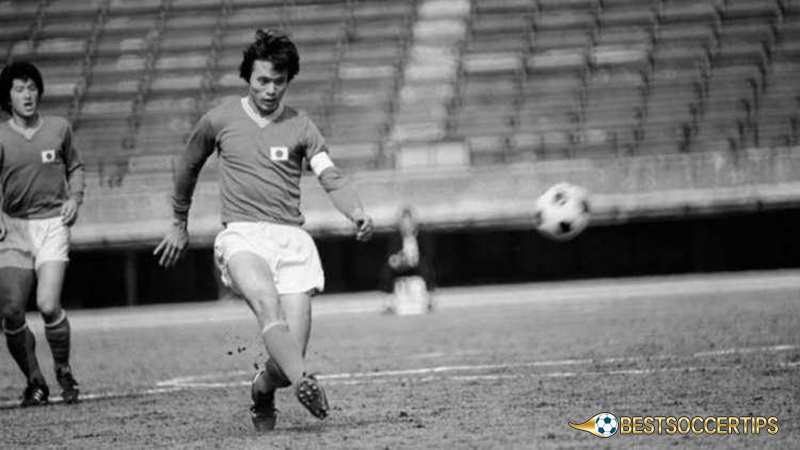
Throughout his 17-year tenure with Yanmar Diesel, this center-forward demonstrated patience and talent by scoring over 250 goals. Kamamoto’s stability and goal-scoring ability greatly contributed to the team’s success and left a profound mark on the history of Japanese football.
Conclusion
The rise of Japanese football players in top European clubs reflects not only the nation’s commitment to nurturing athletic talent but also the growing global recognition of Japan’s football prowess. With stars like Maya Yoshida commanding respect on the Bundesliga stage and Shinji Kagawa shining in the Premier League, Japanese players have cemented their place among the world’s elite. Coupled with their presence in major international tournaments like the FIFA World Cup, where players like Keisuke Honda have left an indelible mark, Japan’s football journey is one of steady progress and undeniable impact. As the country continues to produce exceptional talents like Yuki Soma and Takumi Minamino, the future of Japanese football appears bright, promising, and poised for even greater achievements on both the domestic and international fronts.
See more: Learn about the best player in Tottenham of all time




